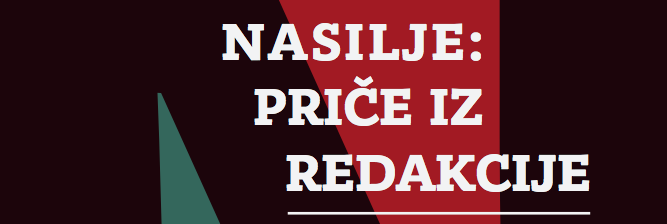The publication “Invisible Violence: Stories from The Newsroom”, in which are the stories about to what extent are journalists able to do their work in the newsroom and are their rights respected, was published in four languages – BHSM, Albanian, Macedonian and English.
The research is based on interviews with colleagues in five countries – Bosnia and Herzegovina, Serbia, Montenegro, Kosovo and Macedonia.
Journalists are on the one hand under open political pressures and threats, often being put on the spot during press conferences by country leaders, and on the other in conflict with editors regarding certain subjects. They are in a precarious position and they do their work under the conditions of insecurity, discrimination, censorship and open pressures, which in the end result in self-censorship.
“The best proof is the fact that most journalists whom we have talked to insisted on staying anonymous, due to the fear of losing their jobs or being prevented from finding one in the future, or due to the feeling of embarrassment for having succumbed to pressures.
With fifty interviews with our colleagues working in the public, commercial and non-profit sectors, in other words, civil society media, conducted from January to May 2018, we tried to present to the public their working conditions – something that is rarely talked about in public or not at all. While the atmosphere in each society influences the way journalists do their work, our interlocutors have one thing in common and that is fear; and societies where journalists are afraid are not free societies”, the publication concludes, and emphasizes that as many as 70% of interviewed journalists in the region in a small survey conducted in the afore mentioned five countries, stated that they would change their jobs or the newsroom they are working in, citing as the main reason low salaries (42%), followed by censorship inside the newsroom (15%).
The authors of the research are journalists Biljana Sekulovska, Una Hajdari, Nidzara Ahmetasevic, Milica Bogdanovic and Zarka Radoja, and the introductory text was written by Viktor Ivancic, founder of the cult Split newspaper “Feral Tribune”, columnist of the weekly “Novosti” and author of the essay on journalism “Why I am not writing and other essays “.
Journalists state that, despite the awareness of the level of censorship and self-censorship, as well as the process that journalism is going through on a global scale, the degree of journalists’ fear speaks of the pressures they are facing on daily basis while working and begs the question about the profession itself and the possibility for overcoming the current situation of utter insecurity in the financial, social and the political sense.
That is why, with the research, two video installations have been made in which more than 40 journalists from the five countries mentioned answer to the questions “What is a journalist today?” and “How to Improve the position of Journalists?”
“We are convinced that the answer is the recognition of the problems in these countries – problems we all share, like insecurity, destroyed syndicates, professional associations that are overloaded or out focus and an overall dissatisfaction with the position of the profession – as well as a greater solidarity in the resistance”, the authors of the project concluded.



